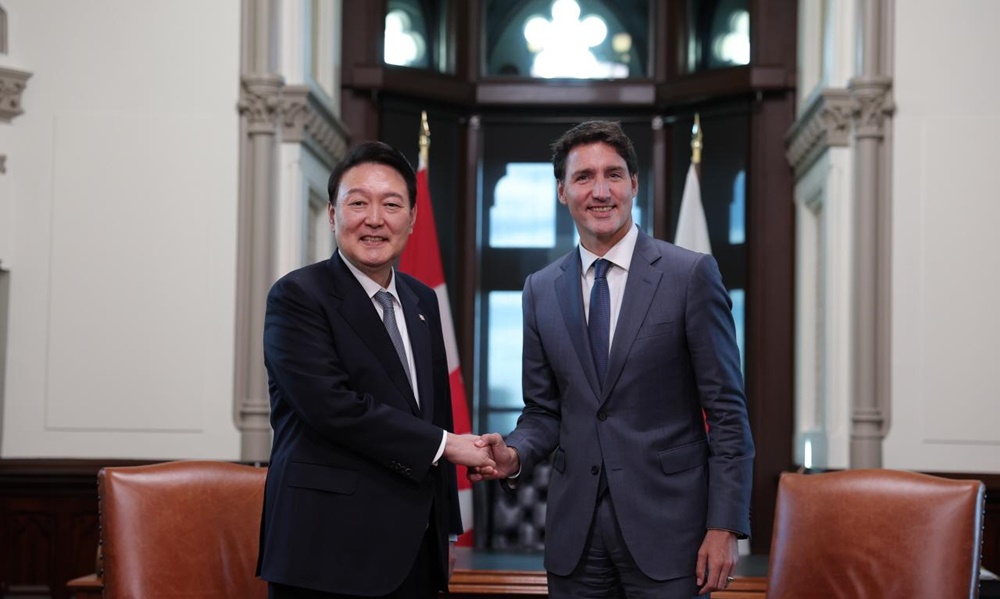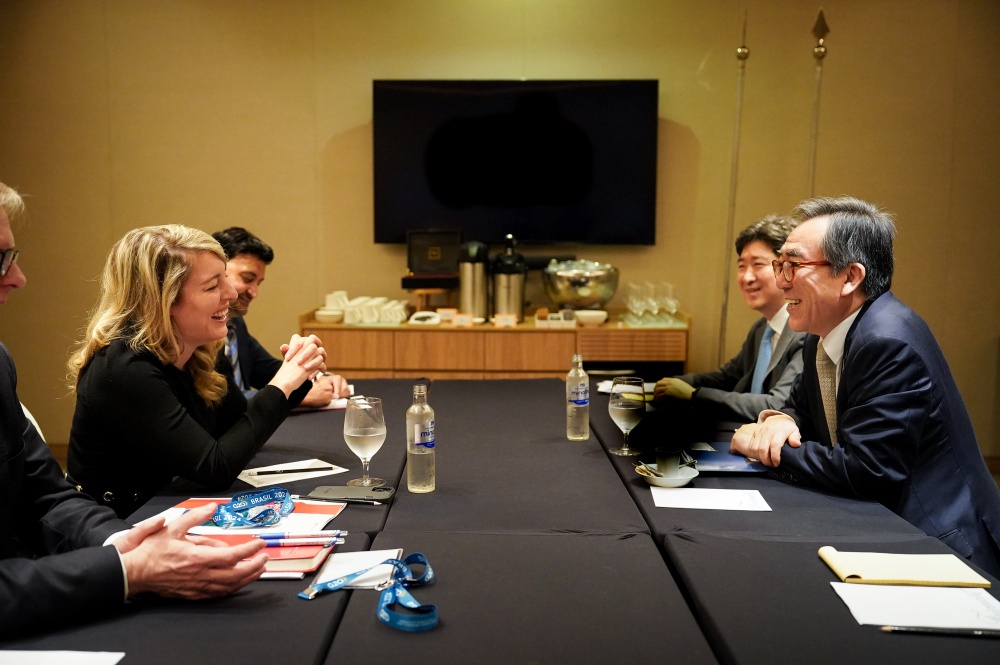
Korea-Canada Bilateral Relations 
Looking back in History
Over 100 Years of Friendship
Korea-Canada relations date back to 1888, when Canadian missionaries began arriving on the Korean Peninsula. Notable among them is James Scarth Gale (1863-1937) of Toronto, who was the first Canadian to set foot on Korean soil. Famous for his creation of the first Korean-English dictionary, Gale also drafted the first Korean translation of the Christian Bible and wrote the first substantial history of Korea in English.
Dr. Oliver Avison (1860-1956), a noted scholar and philanthropist, was not only a personal physician to King Gojong (1852-1919) but also founded the Severance Hospital in Seoul and the medical college that became Yonsei University.
Dr. Francis Schofield (1889-1970) from Guelph, Ontario, became a national hero in Korea for his participation in the 1919 Independence Movement against Japanese colonial rule. Dr. Schofield has the honour of being the only foreigner buried in the Patriot's Section of Korea's National Cemetery.
Between 1888 and 1941, a total of 185 Canadian missionaries served in Korea. Many made significant contributions to Korea’s path towards modernization, particularly in the fields of education and health.
Canada in the Korean War
Amongst the United Nations (UN) participating countries in the Korean War (1950-1953), Canada dispatched the 3rd largest contingent, with 26,791 soldiers. This represented one of Canada's most significant military engagements in the latter half of the 20th century. Sadly, 516 Canadians died in action and 379 were laid to rest in the UN cemetery located in Busan, Korea.
To commemorate the sacrifices of those who served in the Korean War, a ceremony of remembrance is held every year at the National War Memorial in Ottawa and also in many cities and towns throughout Canada.
Under the ‘Veterans Revisit Korea Program,’ the Ministry of Patriots and Veterans Affairs regularly invites a select number of Canadian veterans and their families to visit Korea. Similarly, under the ‘Peace Camp for Youth program,’ descendants of Korean War Veterans are also invited to visit Korea on a regular basis.
2023 marked the 70th Anniversary of the Korean War Armistice with many events being held across Canada to commemorate the occasion. This included the unveiling of the Battle of Gapyeong Victory Monument in Airdrie, Alberta. In addition to the monument in Airdrie, four other monuments have been erected in Langley, British Columbia, Winnipeg, Manitoba, and in Brampton and Niagara Falls, Ontario.
With the rememberance of all those who served and sacrificed in the Korean War, both nations continue to strengthen peace and security cooperation on the Korean Peninsula.
60th Anniversary of Diplomatic Relations in 2023
In 2023, Korea and Canada celebrated the 60th anniversary of formal diplomatic relations. Bilateral ties were first formally recognized on January 14, 1963 with Korea's Embassy opening in Ottawa in 1965 and Canada's Embassy in Seoul opening in 1973. Along with their respective embassies, Korea maintains Consulated General in Vancouver, Toronto and Montreal, while Canada maintains a Consulate General in Busan.
Bilateral Cooperation
Korea and Canada have steadily developed a strategic partnership and established robust trade and investment relationships based on our complementary values, economic structures and our close people-to-people ties.
Korea-Canada FTA
The Korea-Canada Free Trade Agreement (FTA) stands as Korea's eleventh such agreement and Canada's first in the Asia-Pacific region, representing a landmark achievement for both countries. The Agreement, which came into force on January 1, 2015, has increased bilateral trade in key sectors such as automobiles, electronics, energy, forestry, agriculture, and commercial fishing. The Agreement has also opened new avenues for collaboration in pharmaceuticals, steels, aerospace, and artificial industries, along with cultural exchanges.
Comprehensive Strategic Partnership
On September 23, President Yoon Suk Yeol and Canadian Prime Minister Justin Trudeau agreed to enhance the bilateral relationship to a comprehensive Strategic Partnership focused on advancing five shared priorities. These include;
△ Defending the rules Based on International System, Democracy, Freedom, Human Rights, and Gender Equality
△ Strengthening Security and Defense Partnerships, including Peacekeeping and Maritime security
△ Enhancing Economic Prosperity and Security, Cooperating on Supply Chains, Critical Minerals, and ST&I, and Promoting Trade and Investment
△ Addressing Climate Change and the Environment, Supporting Energy Security, and Developing Sustainable Energy Source
△ Deepening Partnerships in health and Culture
In the fight against climate change, Korea and Canada signed the Memorandum of Understanding on Climate Change Cooperation, which includes an annual dialogue held between our respective Ambassadors for Climate Change.
In preparing our countries for the 21st century economy, Korea and Canada signed the MOU on Cooperation in Critical Mineral Supply Chains, the Clean Energy Transition and Energy Security. To facilitate deeper Research and Developmenet cooperation and leverage each countries' respective economic strengths, Korea and Canada signed a Memorandum of Understanding on Industrial Technology and Innovation Partnerships. As well, as convening the first 2+2 High Level Economic Security Dialogue with the participation of our respective Ministers of Foreign Affairs and Industry.
In pursuit of strengthening our defence cooperation, Korea and Canada signed a Memorandum of Understanding on Defence Material and Research and Development Cooperation. As well as redoubled our efforts to maintain peace on the Korean peninsula through supporting the United Nations Command.
Bilateral Summit Diplomacy

In Ottawa, President Yoon Suk Yeol met with Prime Minister Justin Trudeau on September 23. 2022
Foreign Ministers' Meeting

On February 21, 2024, ROK Minister of Foreign Affairs Cho Tae-yeol met with Canadian Foreign Minister Mélanie Joly on the sidelines of the G20 Foreign Ministers' Meeting.
Regional & Multilateral Cooperation
Regional and Global Cooperation
With its entry into the United Nations in 1991 and accession to the OECD Development Assistance Committee in 2010, Korea's rapid development democratic evolution, and growing regional and international contributions have enhanced cooperation between Korea and Canada.
This is no more evident than with the near simultaneous releases of each countries' Indo-Pacific Strategies in 2022. Likened as 'twins' due to both including the subconcept of the North Pacific, Korea and Canada are closely aligned on promoting regional security based on shared norms and rules; building and expanding economic security networks through greater trade, investment and more resilient supply chains; and being active, engaged and contributing partners across the entire region.
Indeed, as like-minded allies, Korea and Canada share similar views on a wide range of global issues and have been close partners in promoting peace and security around the globe, including on the Korean Peninsula and in North East Asia.
Canada firmly supports Korea's ongoing efforts to achieve complete denuclearization and the establishment of a permanent and solid peace on the Korean Peninsula. Korea welcomed Canada's commitment to renewing Operation NEON in 2023 to enforce UN Security Council sanctions imposed against North Korea for its missile and nuclear weapons programs.
Taking note of the increasing role of both countries in addressing today's global challenges, both governments are committed to strengthening cooperation in other areas including climate change, international development, and Women, Peace and Security.
Korea and Canada also closely work together in the ASEAN Regional Forum (ARF), the Asia-Pacific Economic Co-operation (APEC) forum, and the World Trade Organization (WTO), among others. Canada has been a steadfast supporter for continued involvement for Korea in the Arctic Council, Group of Seven (G7) and the North Atlantic Treaty Organization (NATO).
Trade and Investment
Trade
For over half a century, Korea and Canada have enjoyed stable trade relations. Today, Korea is Canada’s 7th largest trading partner and 3rd largest market in Asia. The average annual trade volume between the two countries surpassed $10 billion USD for the first time in 2011, and has seen robust growth since then.
Korean exports to Canada, 2023: 1) Automobiles 2) Steel Tubes 3) Automobile Parts 4) Steel pipes and steel wires 5) Gold, Silver and Platinum
Canadian exports to Korea, 2023: 1) Coal 2) Copper Ore 3) Iron Ore 4) Meat 5) LPG
Investment
Korea’s accumulated investment in Canada reached $15.7 billon USD (2022)
Canada’s accumulated investment in Korea is $4.3 billion USD (2022).
People-to-People Exchanges
Approximately 247,000 Canadians of Korean descent reside in Canada, while more than 26,000 Canadians live in Korea. Korea is the 7th important source country of international students to Canada, while hundreds of young Canadians go to Korea each year to teach English.
Korea is committed to strengthening people-to-people exchange with Canada, especially among future generations. In January 2024, the two countries launched the Korea-Canada Youth Mobility Program, greatly expanding opportunities for their youth to travel and work in the other country. This new Program increased the eligibility age fim 18-30 to 18-35 and added two new categories - Young Professionals and International Co-op - to the existing Working Holiday Program. Most youth will also be allowed to stay in the other country for up to 24 months, compared to the previous assigned 12 months, and participate twice in the Program. The robust people-to-people exchanges will serve as a solid foundation for the development of bilateral relations going forward.

